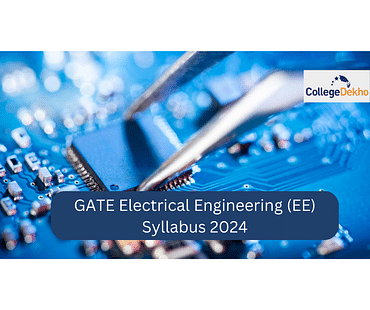Electrical Engineering is considered one of the important courses that usually candidates take to advance their career after qualifying the GATE exam. Candidates can check the GATE electrical engineering syllabus 2024 here including the important topics and cutoff.
- GATE 2024 Syllabus of Electrical Engineering - PDF Download
- Section Wise Division of GATE 2024 Electrical Engineering Syllabus
- Engineering Mathematics Syllabus for Electrical Engineering
- Electric Circuit Syllabus of Electrical Engineering
- Electromagnetic Fields Section Syllabus
- Syllabus of Signals and Systems
- Electrical Machines Section Electrical Engineering Syllabus
- Electrical Engineering Syllabus of Power Systems Section
- Electrical Engineering Syllabus of Control Systems Section
- Electrical and Electronic Measurements Section Syllabus
- Analog and Digital Electronics Syllabus of Electrical Engineering
- Power Electronics Syllabus for Electrical Engineering
- Important Books to Cover GATE Electrical Engineering (EE) Syllabus 2024
- GATE Previous Year Electrical Engineering Cutoff

GATE Electrical Engineering (EE) Syllabus 2024: Electrical engineers are at the vanguard of cutting-edge technologies, including artificial intelligence, nanotechnology, and sustainable power systems. However, that's not all. They have an effect on our regular activities in ways that we hardly ever realise. Electrical engineers play a role in everything from traffic lights to mobile phones to power networks. A vast number of subfields fall under the purview of electrical engineering, including electronics, digital computers, power engineering, telecommunications, control systems, RF engineering, and signal processing. Obtaining an M.Tech in electrical engineering through qualifying GATE 2024 will give aspiring professionals the knowledge and engineering abilities they need to build, evaluate and enhance electrical systems.
Ongoing Event: GATE Application Form 2024 (Available)GATE 2024 examination will be conducted by the prestigious Indian Institute of Science, Bangalore on February 3, 4, 10 and 11, 2024 respectively. Candidates who are aspiring to take electrical engineering as their career must successfully clear the GATE exam and GATE 2024 electrical engineering syllabus plays a crucial role in assisting candidates to do that. GATE 2024 syllabus of electrical engineering was released by IISc, Bangalore on its official website. Therefore a complete understanding of the GATE electrical engineering syllabus 2024 assists applicants to improve their level of preparedness and also decipher the most important topics from the preview of the GATE exam. Candidates can check this article to have a detailed understanding of the electrical engineering syllabus of GATE 2024 along with the major topics for every section and also the electrical engineering cutoff of previous year here.
Also Read:GATE 2024 Syllabus of Electrical Engineering - PDF Download
Particulars | Details |
|---|---|
GATE Electrical Engineering (EE) Syllabus 2024 PDF Download |
Section Wise Division of GATE 2024 Electrical Engineering Syllabus
Candidates preparing for the GATE 2024 electrical engineering course should keep in mind the sections that consist of the electrical engineering syllabus of GATE 2024. All the ten sections of the syllabus are mentioned below.
- Engineering Mathematics
- Electric Circuits
- Electromagnetic Fields
- Signals and Systems
- Electrical Machines
- Power Systems
- Control Systems
- Electrical and Electronic Measurements
- Analog and Digital Electronics
- Power Electronics
Engineering Mathematics Syllabus for Electrical Engineering
Candidates can check the below table to know about the engineering mathematics syllabus of electrical engineering. Along with that, we have also mentioned for the assistance of every candidate the most vital topics from each section of the engineering mathematics syllabus in the below table.
Sections | All Topics | Important Topics |
|---|---|---|
Linear Algebra |
|
|
Calculus |
|
|
Differential Equations |
|
|
Probability and Statistics |
|
|
Complex Variables |
|
|
Electric Circuit Syllabus of Electrical Engineering
Electric circuits form an important section of the electrical engineering course. Candidates can check the electric circuit syllabus of electrical engineering here in the table.
Section | All Topics | Important Topics |
|---|---|---|
Network Elements |
|
|
Electromagnetic Fields Section Syllabus
The section electromagnetic fields comprises the following topics mentioned in the below table.
Section | All Topics | Important Topics |
|---|---|---|
Electromagnetic Fields |
|
|
Syllabus of Signals and Systems
Electrical engineering syllabus of signals and systems is mentioned below.
Sections | All Topics | Important Topics |
|---|---|---|
Signals and Systems |
|
|
Electrical Machines Section Electrical Engineering Syllabus
Candidates can check the electrical machines section of the electrical engineering syllabus here in the below table.
Sections | All Topics | Important Topics |
|---|---|---|
Electrical Machines |
|
|
Electrical Engineering Syllabus of Power Systems Section
The power systems section of the electrical engineering course comprises the below mentioned syllabus and important topics.
Section | All Topics | Important Topics |
|---|---|---|
Power System |
|
|
Electrical Engineering Syllabus of Control Systems Section
Candidates can check the detailed syllabus and important topics here in the below table.
Section | All Topics | Important Topics |
|---|---|---|
Control System |
|
|
Electrical and Electronic Measurements Section Syllabus
The section electrical and electronic measurements comprises the following topics mentioned in the below table.
Sections | All Topics | Important Topics |
|---|---|---|
Electrical and Electronic Measurements |
|
|
Analog and Digital Electronics Syllabus of Electrical Engineering
Analog and digital electronics form an important section of the electrical engineering course. Candidates can check the analog and digital electronics syllabus of electrical engineering here in the table.
Sections | All Topics | Important Topics |
|---|---|---|
Analog and Digital Electronics |
|
|
Power Electronics Syllabus for Electrical Engineering
Candidates can check the below table to know about the power electronics syllabus of electrical engineering. Along with that, we have also mentioned for the assistance of every candidate the most vital topics from each section of the power electronics syllabus in the below table.
Sections | All Topics | Important Topics |
|---|---|---|
Power Electronics |
|
|
Related Articles:
Important Books to Cover GATE Electrical Engineering (EE) Syllabus 2024
Candidates can check the list of books to cover the entire electrical engineering syllabus of GATE 2024.
Topic | Important Books | Author |
|---|---|---|
Analog | Electronic Devices and Circuit Theory | Boylestad |
Control system | Control Systems Engineering | Nagrath and Gopal |
Circuit analysis | Transient Analysis Of Electric Power Circuits | Arieh L Shenkmann and also Chakraborty |
Digital Circuits | Digital Electronics | Digital Design by M.Morris Mano |
Electrical Machine | Electrical Machinery | P.S.Bimbhra |
Electro Magnetics |
|
|
Engineering Mathematics | Advanced Engineering Mathematics | E.Kreyszig |
Power system |
|
|
Power Electronics |
|
|
Networks | Engineering Circuit Analysis | Hayt and Kemmerly |
Problem Solving | GATE Electrical | RK Kanodia |
Measurement |
| AK Sawhney |
Signal and systems |
|
|
GATE Previous Year Electrical Engineering Cutoff
To qualify the GATE 2024 exam, candidates are required to score more than the GATE cutoff marks. Applicants can check the electrical engineering previous year cutoff of GATE in the table below.
Year | General Category | OBC Category | SC / ST / PH Category |
|---|---|---|---|
2023 | 25 | 22.5 | 16.6 |
2022 | 30.7 | 27.6 | 20.4 |
2021 | 30.3 | 27.2 | 20.2 |
2020 | 33.4 | 30.0 | 22.2 |
2019 | 39.6 | 35.6 | 26.4 |
2018 | 29.1 | 26.1 | 19.4 |
2017 | 25.20 | 25.20 | 16.70 |
2016 | 25.1 | 22.5 | 16.7 |
2015 | 25 | 22.5 | 16.67 |
2014 | 25 | 22.5 | 16.67 |
2013 | 25.74 | 23.17 | 17.16 |
With this article, candidates can have a detailed analysis of the syllabus of electrical engineering for GATE 2024 and also know about the important topics for each section that constitute the GATE electrical engineering syllabus 2024.
Are you feeling lost and unsure about what career path to take after completing 12th standard?
Say goodbye to confusion and hello to a bright future!

GATE Previous Year Question Paper
Was this article helpful?



















Similar Articles
Most Important Topic & Weightage for KCET 2025 Mathematics
KCET Maths Practice Papers 2025
KCET 2025 Mathematics Syllabus - Important Topics, PDF and Weightage
How to Score 50+ Marks in KCET Maths 2025?
How to Score 50+ Marks in KCET Biology 2025
KCET 2025 Maths 30 Days Preparation Plan